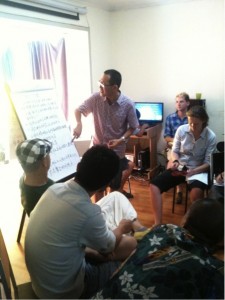
Hongwei Bao leads discussion at the workshop. Pictured are (facing camera) Andrew Diver (University of Cambridge postgraduate student) and Elisabeth Engebretsen.
In August 2013 the Borders of Sexuality and Desire network held an international workshop in Beijing at the city’s LGBT Center.
The event built on the successes of the historic 2013 National LGBT Conference, organised by several of the members of the network. This national conference was a two-day event that attracted more than 140 queer activists, organizers, and academics from across the People’s Republic of China, including not just developed eastern areas, but also Tibet and several other interior regions.
On the day following this conference, the network hosted more than 40 core participants from the enlightening weekend for discussion, planning, and dialogue. At the workshop we discussed ways to harness the conference’s momentum to strengthen global queer exchanges, especially as China is now a key voice in the growing international fields of sexuality and gender studies.
Discussions at the workshop focused on these key themes:
- Indigenization versus globalization of the queer movement—How appropriate is contemporary queer theory, which emanates largely from the west, to the Chinese context, and what can the west learn from China’s example?
- Defining terminology—How do concepts such as ‘comrade’ (tongzhi; a contemporary Chinese colloquialism referring to non-normative sexualities), ‘queer’ (ku’er; an English loan word used among academics and activists but that is also increasingly used in popular contexts), and ‘LGBT’ (another English loan, meant as a catch-all but that often excludes as much as it includes) contribute to an understanding of what it’s like to have a non-mainstream sexuality in contemporary China?
- Understanding the movement—Is it necessary to define ‘a movement’, by which process inevitably some people will be excluded?
- Locating practice—How can queer activists and scholars in China incorporate the needs of small towns and rural areas into what has been largely an urban movement?
- Building relationships—How can queer activism and queer scholarship build fruitful mutual exchanges?
Organizing participants in the workshop included:
- Dr Hongwei Bao (Lecturer in Media Studies, Nottingham University, UK)
- Dr Elisabeth Engebretsen (Research Fellow, Asian Cities Cluster, International Institute of Asian Studies, Leiden, Netherlands)
- Dr William Schroeder (Lecturer in Chinese Studies, The University of Manchester, UK)
- Wei Jiangang (Beijing Gender Health Institute)
- Dr Wei Wei (East China Normal University)
- Fan Popo (China Queer Independent Films)
- Shitou (independent artist)
- Dr Xiaopei He (Pink Space)
Future events are in planning and may include expanding the network’s activities to Hong Kong and Taiwan. An edited volume that builds on other workshops and includes contributions from many of the network’s participants is under consideration at the Nordic Institute for Asian Studies Press.
